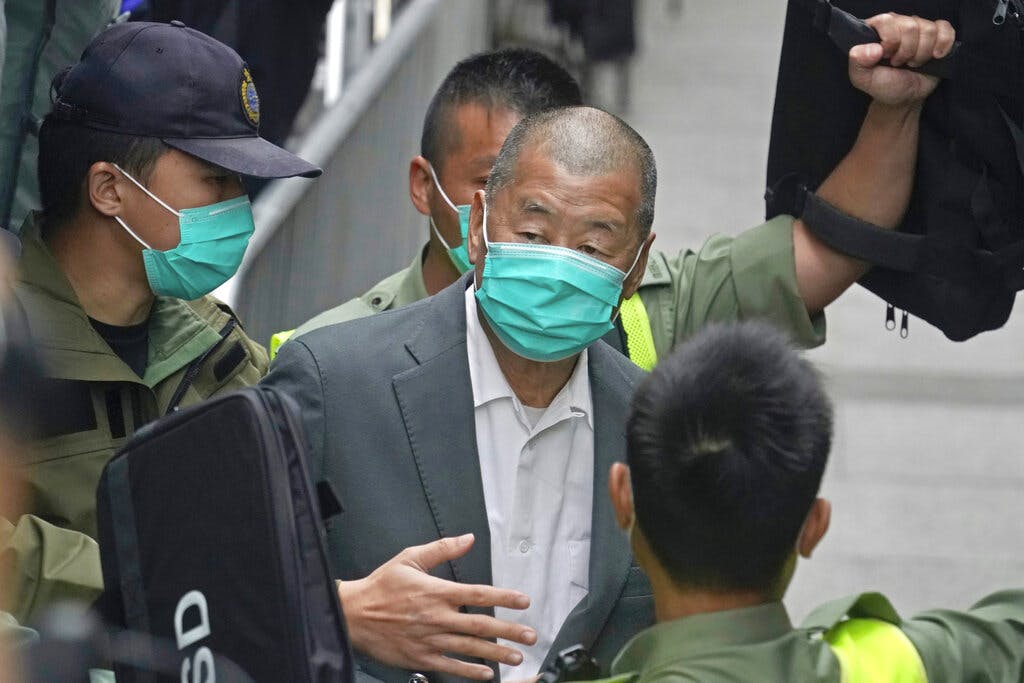Latest Verdict Against Jimmy Lai Is Sideshow Pending Trial Under National Security Law
Hero of democracy movement draws 69 months on interim charges of renting out part of his office space.

It was not enough for Chinese authorities in Hong Kong to force Jimmy Lai to unload his budding business empire and shut down his popular newspaper, Apple Daily. They’ve had to get him on charges large and small, and a court has just sentenced him to 69 months for renting out part of his office space to one of his companies.
The office space deal would appear to be the type that’s routine in Hong Kong’s fast-moving business environment, but a judge in handing down sentence said Mr. Lai had failed to show the requisite guilt. Not that contrition would have mattered in a system in which the media has no scope for criticizing the government.
It is, after all, a communist regime, and China’s president, Xi Jinping, has stamped out a protest movement in which Mr. Lai’s newspaper had a leading role. So photographs showed the 74-year-old Mr. Lai bound in chains and handcuffs as he was led to the court from the prison in which he was jailed two years ago.
The sham trial was a sideshow on the way to the trial that Mr. Lai still faces for violating Chana’s draconian national security law by spurring on demonstrations that rocked Hong Kong. The former British colony reverted to Chinese rule in 1997, against promises that have been long since broken by the communists.
Mr. Lai’s scrappy newspaper, whose circulation rose at one point to 400,000 a day, fully supported protesters. They wanted to hold the communist Chinese government in Beijing to its pledge for Hong Kong to be self-governing for 50 years. Beijing had already installed its own people in top jobs and stamped out most democratic freedoms.
What’s happened to Mr. Lai and his company, Next Digital, is the most visible evidence of repression of free speech in an environment in which dozens of papers once competed with one another while often criticizing the government. The importance of the jailing of Mr. Lai can’t be overstated.
For Mr. Lai, this conviction means merely that he must stay where he’s been held since December 2020. “He remains behind bars awaiting trial on national security charges for his support for Hong Kong’s fight for democracy,” Mr. Lai’s son, Sebastian, wrote in The New York Sun in May.
A Next Digital executive who’s been working behalf of Mr. Lai, Mark Simon, sees no chance the Chinese will decide to free Mr. Lai. Crimes under the national security law are punishable by up to life imprisonment. It is impossible to “imagine Beijing letting Jimmy Lai go as he is their entire narrative of foreign interference in Hong Kong,” Mr. Simon told the Sun.
Meanwhile, Mr. Simon said, it’s necessary to “drop the pretense that there is any rule of law in Hong Kong.” Chinese authorities, however, remain hyper-sensitive to the criticism inspired by Mr. Lai’s case. Hong Kong, Mr. Simon says, “has deployed teams from their economic affairs offices to counter ‘pro-Lai’ messages.”
“They are feeling the pressure and it’s growing significantly,” Mr. Simon says, as the time for Mr. Lai’s trial on national security charges approaches.
Mr. Lai’s ordeal marks the downfall of an entrepreneur who founded his business in the best tradition in what had been a free-wheeling capitalist community. He made his initial fortune by opening up a clothing chain, Giordano, whose shops became beacons of affordable fashions throughout Asia.
Mr. Lai established himself as a strong voice for anti-Beijing dissent by daring to criticize the Chinese crackdown at Tiananmen Square in June 1989. He originally criticized the government in a magazine that he founded before launching Apple Daily in 1995.
The paper ceased publication in June 2021 after the government froze its assets. More than a million persons bought the paper’s last edition — souvenirs of a voice that had, over 26 years, become a global symbol of press freedom through sometimes raucous, sensational coverage of Hong Kong’s losing struggle for freedom from communist rule.

